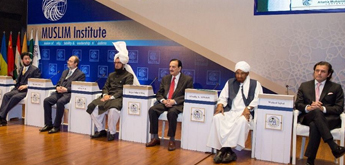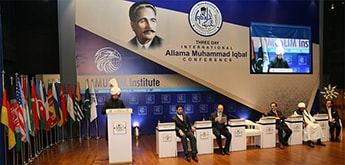|
MUSLIM Institute organized ‘3 Day International Allama Muhammad Iqbal Conference’ at Islamabad. On 1st day, inaugural session of the conference was presided by Hadhrat Sultan Muhammad Ali (Founding Father MUSLIM Institute). Raja Zafar ul Haq (Leader of House, Senate of Pakistan) was chief guest on the occasion. Second session (Iqbal and the World of the Spirit) of the conference was Chaired by Prof. Ehsan Akbar (Writer & Poet, Islamabad). A large number of people from academia, social sector, media and from different walks of life participated in the Conference.
Brief Summary of the remarks shared by speakers in two sessions are observed as under:
|
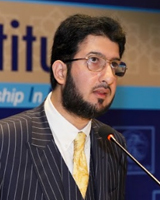 |
Sahibzada Sultan Ahmad Ali
Chairman, MUSLIM Institute
|
|
I would like to extend my deep and personal gratitude to each one of the distinguished delegates who have accepted our invitation, spared their valuable time out of their busy schedules and have joined us in this conference. We have tried to bring the international and national academia on a single platform to share their knowledge, research and perspectives about Allama Iqbal in order to achieve mutual understandings with a special focus to inspire the young generation and future leaders, researchers, students and intellectuals. Iqbal is not only a poet, Iqbal is not only a philosopher, Iqbal is not only an expert of politics, rather Iqbal is an aspiration, Iqbal is a hope and Iqbal is an ambition which is present in the heart of every freedom lover and generous human being. Iqbal is the ambition and a hope of the revolution. Every single notion of Iqbal carries the potential of building a new nation.
|
|
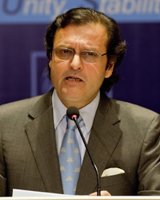 |
Mr. Waleed Iqbal
Grandson of Allama Muhammad Iqbal
|
|
I am extremely pleased and immensely grateful to the MUSLIM Institute for having organized this magnificent gathering in recognition of the life and works of Allama Iqbal. The concept of 'Khudi’ or self-hood is the shining light of divinity and of human nature where Allama Iqbal strongly believes in the command that humans have over the universe. Iqbal’s poetry rises to such level where human beings become co-workers with God that comes through his tremendous symbolism and message for the youth in the concept of ‘Shaheen’, a visionary magnificent bird that sores high and craves solitude because in solitude there can be creativity which shuns materialism and which does not hunt, prey or eat anything that is hunted by any other bird or animal. He visualizes a society where the concept of ‘Toheed’ the Oneness of God from Islam represents a symbol of human unity, human solidarity and human equality.
|
|
|
|
|
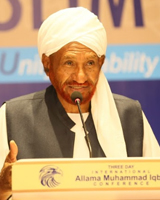 |
Abdul Rehman Al Mahdi
Former Prime Minister, Republic of Sudan
|
|
Allama Muhammad Iqbal is in the league with Goethe for German Culture, Shakespeare for English Culture, Firdausi for Persian Culture and so on. Iqbal belongs to the school of those who were well versed both in Islamic culture and Western culture like Malik Bin Nabi, Ali Shariati etc. For Iqbal, the end of Prophet-hood should constitute the birth of discursive intellect and spiritual aspiration for people. Exercising such empowerment, Iqbal sought a very daring task under the title: Reconstruction of religious thought in Islam. Iqbal argued for a view of fate that rejects the traditional fateful determination as a part of Islamic dogma. Iqbal argued that people are free to determine their own fate. He denounces spirituality which condones the status quo. There is an organic link between spiritual awareness and social justice, the calm for liberating the oppressed people. Iqbal advocated both rationalism and Sufism; he saw both as components of the attributes of Man. In this respect, his thinking made a constructive cross cultural awareness between Muslim and western rationalists, and between Muslim and Western Sufis and mystics. In short Iqbal is as relevant to the contemporary world as he was in previous century Allama Muhammad Iqbal has paid the tribute to the all the freedom fighters including Mehdi Sudani.
|
|
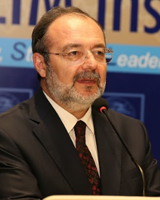 |
H.E. Prof. Dr. Mehmet Gormez
Former President, Presidency of Religious Affairs, Republic of Turkey
|
|
Beyond any doubt, Allama Muhammad Iqbal is one of the most dynamic philosophers of our century. He is the most plausible response that was raised in the Islamic world in the 20th century to Western modernization. Most obvious characteristics that separated him from others were the depth of critical thinking especially in his approach to Islamic inheritance. When compared to others, ?qbal explored the tension between Islamic tradition and modernity more thoroughly. He mentioned issues which are the basic issues of both his period and today such as Ijtih?d (Islamic Independent Reasoning), Islam and democracy. His reflection on society has three dimensions; first is his writings in prose, especially his work entitled “The Reconstruction of religious though in Islam” which is a sophisticated and philosophically creative response to the conceptual model of modernism. Second, to be frank, his poems in Urdu and Persian language which are the most concrete examples of brightest and poetic conciliating thought in erudite, reflective and inspirational poem throughout the Islamic literature and maybe in modern times. Third is his involvement in political activism and social reformism due his social responsibility amidst a critical period of the history.
|
|
|
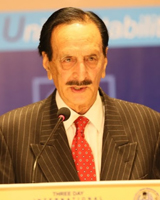 |
Raja Zafar ul Haq
Leader of the House, Senate of Islamic Republic of Pakistan, Secretary General, Motamar Al-Alam Al-Islami
|
|
I would like to extend my warm welcome to the distinguished foreign and local guests to celebrate, acknowledge and rediscover the magnificent eternal wisdom that Iqbal has drawn from the teachings of final revealed book, “The Holy Quran”. The great Iqbal is an immortal symbol of Muslim empowerment and human equality. He was the loudest and the most beautiful sound against the economic and political exploitation of the weak by the powerful. It was not just his beautiful arrangements of the words but the potency of his philosophy and ideas of revival of Islamic polity that inculcated the anti-imperialist sentiments against the unjust colonial power. Each and every aspect of Iqbal’s life is brimmed with protest against inequality, discrimination and oppression in all forms but unlike raw anger, his protest was uniquely bound by optimism. Therefore, he is not only a great thinker in history but an international subject on his own in the fields of philosophy and literature. It was Iqbal’s sincerity with his work that attracted not only regional but global admiration. From Iran, the conferences of Bosnia to the Monuments of Germany and Egypt also the receiving of Turkish honor of “Dost” award in the recognition of his services for humanity, Iqbal is considered an international visionary.
|
|
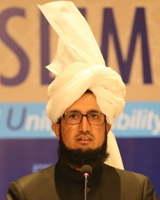 |
H.H. Hadhrat Sultan Muhammad Ali
Founding Father, MUSLIM Institute
|
|
Allama Muhammad Iqbal played the Role of collective conscience of Humanity. Iqbal is not just a person or a poet but Iqbal is the name of an epoch from which many new epochs took birth. Iqbal is such a star in the galaxy of knowledge and literature from which thousands of moons take light. Any such moment when one’s feats waggle in the valleys of intellect, Iqbal’s thought is there to hold the hands of such traveler. In modern times, the numbers of dimensions of Islam which Iqbal explored perhaps no one else could do. Although his basis are philosophy and religion but his thoughts encompasses religion, politics, nationalism, sociology, psychology and many others. We can understand Iqbal by keeping in view all these aspects. Iqbal’s thought is not only universal but he also defended universality. Iqbal’s message inspires us to evolve our intellect that whether we want to live in isolation and individuality and want to spend our life aimlessly or we want to connect ourselves with universal mission and universal thinking. In Iqbal’s view, the purpose of one’s life is to find importance of his existence in that universality and to become shining star of that universality.
|
|
|
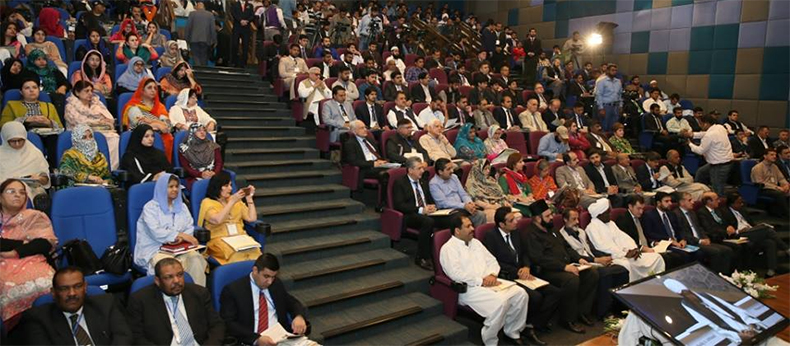 |
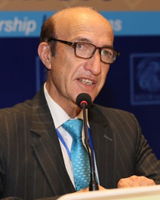 |
Dr. Halim Tanwir
Former D.G, National Archives & International Press Department, Afghanistan
|
|
Allama Muhammad Iqbal always followed pragmatic approach to convey his message by dint of his powerful feelings while recollecting them in tranquillity. His poems gradually try to teach his emotions to his readers. Therefore, we can follow his words one by one in order to understand his concepts one by one. Unfortunately, philosophical lessons of Iqbal are paid less attention now-a-days and people have indulged into very extreme ideas which are neither conducive for Islam nor for the culture of the region. I hope Dari, Persian and Urdu speaking people inclined back towards the great ideas of Iqbal. Intellectually Allama Iqbal was inspired by the Khurasani Islamic scholars from Balkh, Herat, Samarqand, Bukhara and Ghazna, regions citied as the birth place of the Persian language, culture, art and religion of this great region. In combing those thoughts with Indian, Central Asians and European ideas, he produced such philosophical ideas in beautiful poetic verses that enriched the already rich Persian/Dari poetry to even greater extent. In addition, his Islamic philosophy gave the Persian and Urdu speaking Muslims a new way of understanding, explanation and strength in their mutual relations.
|
|
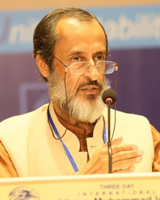 |
Dr. Suheyl Umar
Former Director, Iqbal Academy Pakistan
|
|
For Iqbal, Sufism was a system of repair, a means of repairing the ills of modernity and he was only pointing out the problems within that system of repair through his criticism of some of the decadent aspects of prevalent Sufism. Iqbal’s criticism of Sufism remains within the bosom of Sufism of which he himself was a great champion. Even during the days of the heated debate of Asr?r-i-Khud?, he paid glowing tributes to Sufism and even to Ibn ?Arab?. In the perspective of Sufi metaphysics, the main source of Iqbal’s inspiration, the phenomenon of consciousness, discerned in the world in a hierarchical manner, is a manifestation of the Divine Consciousness. The most central and total manifestation of the Divine Consciousness, a self-disclosure (tajall?) of the Divine Attribute of Knowledge (?Ilm), is the human intelligence. In the same way, it is only man, which has the gift of speech because he alone among earthly creatures is made in the image of God in a direct and integral manner. It is the summit and perfection of human intelligence and, therefore, of human consciousness.
|
|
|
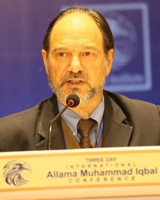 |
Dr. Alan Godlas
Associate Professor, Department of Religion, University of Georgia, USA
|
|
By the needle of his pen, Iqbal stitched certain Quranic verses and Hadiths together with the needs of Muslims in the modern world. In Ramuz-e-Bekhudi, Iqbal emphasizes on Oneness of God while mankind is slave of God. In second theological principle, he sees Quranic expressions, the tint of ALLAH, to be a reference to love. In discussing human anthropology, Iqbal focused on five principle aspects. First anthropological belief of Iqbal is Khudi (the true selfhood) which he defines as a point of light in every one. Second anthropological point is selfhood which is Noor-e-Mohammadi PBUH. Third anthropological principle for Iqbal is that this point of Mohammaden light which is hidden in our true self was made in the image of God and hence, we are mirrors of God. Fourth anthropological belief expressed by Iqbal is that Mohammad (PBUH) is a beloved who is in the heart of every Muslim. Fifth anthropological belief of Iqbal is that the core self of a Muslim is filled with unconditional mercy. The methodology of actualizing one’s self hood is to be the lover of God and Prophet (PBUH).
|
|
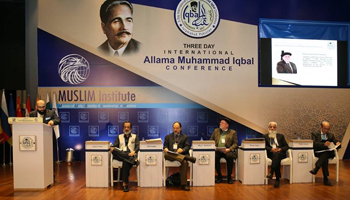
Stage view in 2nd session of conference.
|
| |
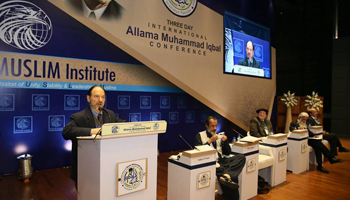
Dr. Alan Godlas (University of Georgia, USA) giving speech.
|
| |
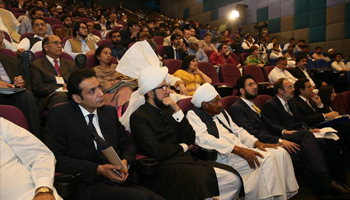
Participants during the 2nd session of conference.
|
|
|
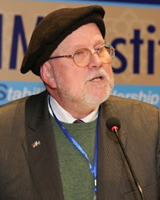 |
Prof. Dr. Hug Van Skyhawk
Department of Science of Religion, Basel University
|
|
In Sir Allama Muhammad Iqbal's Javidnama, the late Annemarie Schimmel found an important development of the Sufi tradition in the Indian Subcontinent: the apotheosis of the Martyr of Divine Love, Husain ibn Mans?r al-Hall??. The apotheosis of the “Martyr of the Love of God”, whose name has been invoked again and again in the progressive poetry of the Islamic nations, occurs in the scene in Iqbal's Persian epic in which the martyr warns "What I did, you do as well---beware! You carry resurrection to the dead---beware!" That is, resurrection, namely, from an encrusted world of legalism, not by the denial of human responsibility, rather as the fulfillment of the true role of man, concerning which it is said in the Holy Qur'?n that God has honored him (s?ra 17.72) and entrusted him with a precious possession (s?ra 33.72). Allama Iqbal, the spiritual father of Pakistan, is perhaps the best example of a modern interpreter of Islam through his poetry which was in everyone's ears in British India in 1930s; for only through the poetic word which is easy to memorize was it possible to reach the largely illiterate masses. He knew that man is called to improve God's earth acting in combination with the Creator and that he must exhaust the never-ending possibilities of interpreting the Holy Qur'?n through the ages.
|
|
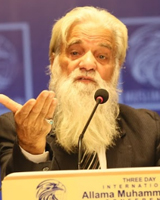 |
Prof. Ahsan Akbar
Writer & Poet, Islamabad
|
|
Iqbal focused a lot on the challenges faced by the Muslim world. Iqbal stressed on spiritualism to cope with issues raised by materialism. Spirituality seems to be imbibed in the childhood of Iqbal. He was born in a pious family and he visited the shrine of Hadrat Nizamuddin before his voyage to Europe for education. During youth, he remained under coaching of teachers like Maulvi Meer Hassan. In beginning, as evident in Bang-e-Dara, Iqbal addressed the topics related to youth and the Muslims. Not to speak of the subcontinent, Kalam-e-Iqbal is equally famous among other nations. Iqbal designated the strengthening of ‘Khudi’ as the way of progression of humanity. Spiritual development is imperative to curb the hazards attached to mere materialistic progress which ultimately culminates into deadly wars. Iqbal concludes that spiritual as well as materialistic development go hand in hand.
|
|
|
|
Lunch Organised by Rawalpindi Chamber of Commerce
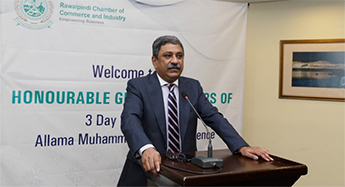 |
| |
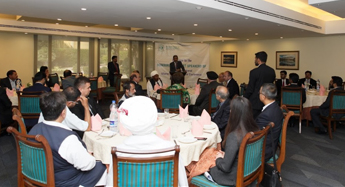
President of Rawalpindi chamber of commerce along with executive members organised lunch in the honour of guest speakers.
|
|
|
Dinner Organised by Hazrat Sultan Muhammad Ali
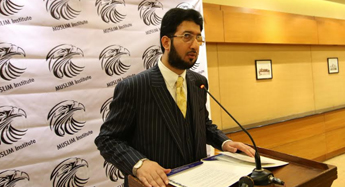 |
| |
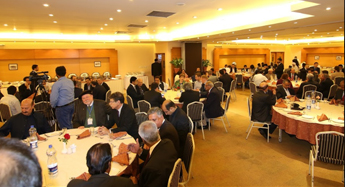
Hazrat Sultan Muhammad Ali (Founding Father, MUSLIM Institute) organised dinner in the honour of guest speakers.
|
|
|
| |




